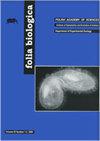Acylated Ghrelin Administration Inhibits Sleeve Gastrectomy-Induced Hippocampal Oxidative Stress, Apoptosis and Tau-Hyperphosphorylation by Activating the PI3K/Akt Pathway.
IF 0.8
4区 生物学
Q4 BIOLOGY
引用次数: 0
Abstract
This study investigated the impact of exogenous replacement therapy with acylated ghrelin (AG) post sleeve gastrectomy (SG) on the memory function in rats. In addition, we investigated the possible underlying mechanisms, including the effects on markers of oxidative stress, tau phosphorylation, and apoptosis. Adult male Wistar rats were divided into four groups (N = 18/group) as follows: sham (control), SG, SG+AG (100 μM), and SG+AG+LY294002 (0.25 μg/100 g). We continued all treatments daily for four weeks post-surgery. SG impaired the spatial, retention, and recognition memories as tested by the Morris water maze test, passive avoidance test, and novel object recognition test, respectively. Also, it enhanced the levels of reactive oxygen species and lipid peroxides, reduced glutathione and protein levels of Bcl-2, and increased the levels of Bax and cleaved caspase-3 in the hippocampus. In addition, SG reduced the hippocampal levels of acetylcholine and brain-derived neurotrophic factor. Concomitantly, it inhibited the hippocampal activity of Akt and increased the activity of glycogen synthase kinase 3β and tau protein phosphorylation. Exogenous administration of acylated ghrelin to rats that had undergone SG prevented memory deficits. Also, it prevented the alteration in the above-mentioned biochemical parameters, an effect that was abolished by co-administration of LY294002 (phosphoinositide 3-kinase inhibitor). In conclusion, AG replacement therapy after SG in rats protects them against memory deficits and hippocampal damage by suppressing tau protein phosphorylation, mediated by activating PI3K/Aktinduced inhibition of glycogen synthase kinase 3β.乙酰化Ghrelin通过激活PI3K/Akt通路抑制袖胃切除术诱导的海马氧化应激、凋亡和tau过度磷酸化
本研究探讨了套筒胃切除术(SG)后乙酰化胃饥饿素(AG)外源性替代疗法对大鼠记忆功能的影响。此外,我们还研究了可能的潜在机制,包括对氧化应激标志物、tau磷酸化和细胞凋亡的影响。将成年雄性Wistar大鼠分为4组(N = 18/组),分别为sham(对照组)、SG、SG+AG (100 μM)、SG+AG+LY294002 (0.25 μg/100 g),术后连续4周每天给药。在Morris水迷宫测试、被动回避测试和新物体识别测试中,SG分别损害了空间记忆、保留记忆和识别记忆。提高海马组织活性氧和脂质过氧化物水平,降低谷胱甘肽和Bcl-2蛋白水平,增加Bax和cleaved caspase-3水平。此外,SG降低了海马乙酰胆碱和脑源性神经营养因子的水平。同时,抑制海马Akt活性,增加糖原合成酶激酶3β活性和tau蛋白磷酸化。外源性给药酰基化胃促生长素的大鼠经历SG防止记忆缺陷。此外,它还能阻止上述生化参数的改变,而与LY294002(磷酸肌苷3-激酶抑制剂)共给药可消除这一作用。综上所述,SG后AG替代治疗通过激活PI3K/ akt诱导的糖原合成酶激酶3β抑制来抑制tau蛋白磷酸化,从而保护大鼠记忆缺陷和海马损伤。
本文章由计算机程序翻译,如有差异,请以英文原文为准。
求助全文
约1分钟内获得全文
求助全文
来源期刊

Folia Biologica-Krakow
医学-生物学
CiteScore
1.10
自引率
14.30%
发文量
15
审稿时长
>12 weeks
期刊介绍:
Folia Biologica (Kraków) is an international online open access journal accepting original scientific articles on various aspects of zoology: phylogeny, genetics, chromosomal studies, ecology, biogeography, experimental zoology and ultrastructural studies. The language of publication is English, articles are assembled in four issues per year.
 求助内容:
求助内容: 应助结果提醒方式:
应助结果提醒方式:


